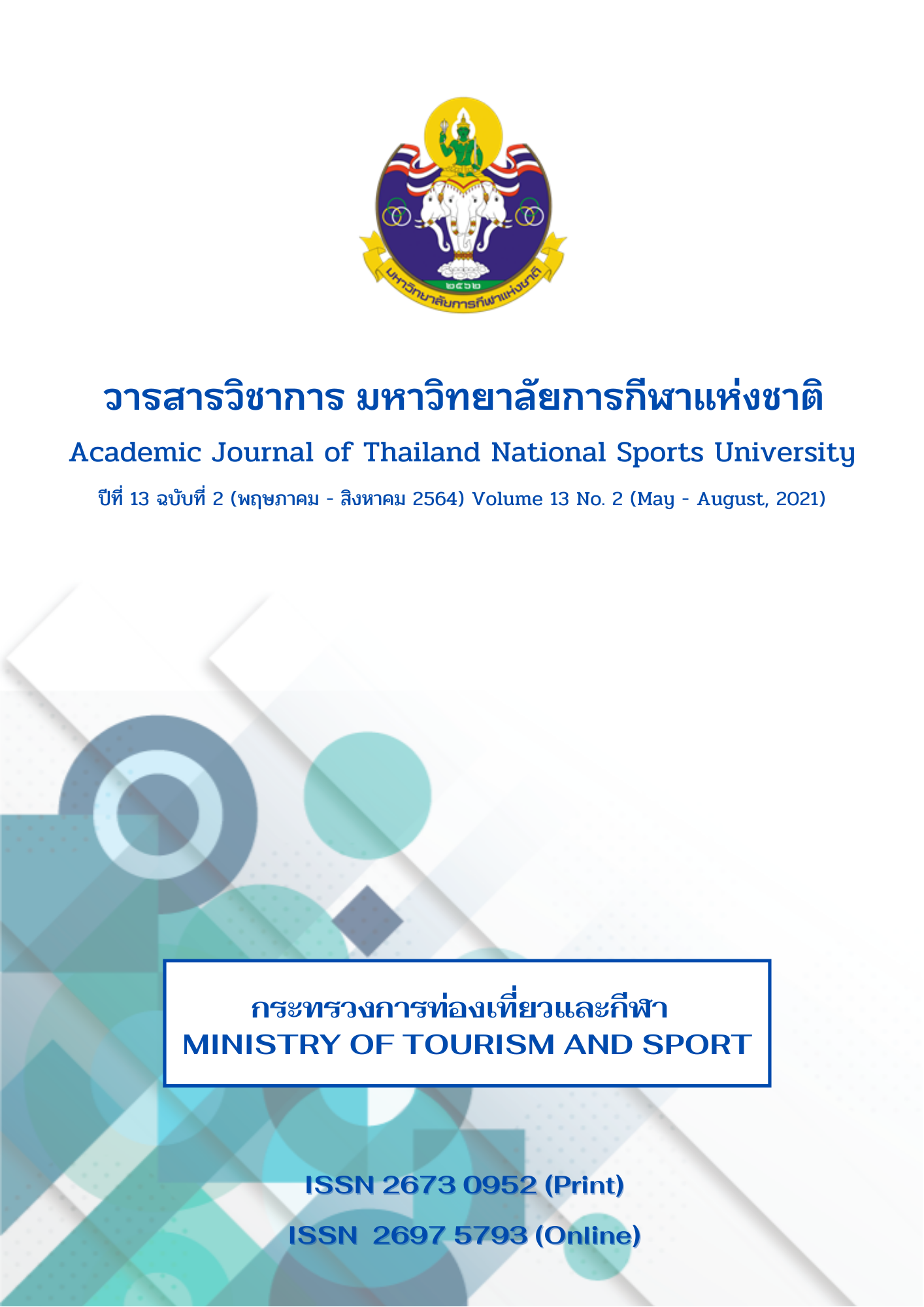EFFECTS OF HEALTH BEHAVIOR PROMOTION PROGRAM AND COMMUNICATION SKILL OF UPPER ELEMENTARY SCHOOL STUDENTS BY APPLYING ACTIVE LEARNING AND PARENTING COORDINATION
Main Article Content
Abstract
The purposes of this study were to compare mean scores of health behavior and communication skills before and after implementation between the experimental group and the control group, and to compare mean scores of health behavior and communication skills after implementation between the experimental group and the control group. The subjects consisted of 40 elementary students, divided into 2 groups with 20 students in the experiemental group received the health behavior promotion program and communication skill of elementary school students by applying active learning and parent’s coordinate, and 20 students in the control group did not received the health behavior promotion program and communication skills. The research instruments were compost of the health behavior promotion program and communication skill of elementary school students by applying active learning and parent’s coordination consists of 5 activities: 1. Self-assessment, 2. Helpful and supportive, 3. Paying attention, 4. Make yourself read more, 5. Carry out activities for 6 weeks, 4 days a week, 1 hour a day, and tests of health behavior and communication skills in reading and writing. The data were analyzed by mean, standard deviation and t-test. Results: The research findings were as follows: The mean scores of health behavior and communication skill of the experimental group students after experiment were significantly higher than before at .05 level, and the mean scores of health behavior and communication skill of the experimental group students after experiment were significantly higher than the control group at .05 level. Health promotion program by applying active learning and parent’s coordinate effect on health behavior and communication skill of the experimental group students after experiment were significantly higher than before at .05 levels.
Article Details
The published article is a copyright of the Academic Journal of Thailand National Sports University. The passage appeared in each article in this academic journal is a perspective of each author which is not related to the journal. Each author is required to be responsible for all components of his/her own article. If there are any mistakes, each author must be responsible for those mistakes on his/her own.
References
Bureau of Dental Health. (2018). 8th National Oral Health Survey Sample of Thailand 2017. Department of Health, Ministry of Public Health of Thailand.
Bussakorn Chalermsinsuwan. (2015). Effects of health education learning management using work-based learning on self-care and communication skills of third grade students. Journal of education Studies, Chulalongkorn University, 47(1), 163-180.
Chontida Yakeaw. (2018). Behavioral the Participation of Parents in the Promotion of Early Childhood Learningthe Child Development Center Eastern Region. Journal of Education and Human Development Sciences, 1(2), 1-14.
Department of Mental Health. (2016). Annual Report, Department of Mental Health Year 2016. Bangkok: Bangkok Blocks Limited Partnership.
Jennifer M. Grossman. (2014). Protective Effects of Middle School Comprehensive Sex Education With Family Involvement. Journal of School Health, 84(11), 739-747.
Jintana Sarayuthpitak. (2018). School Health Programs Books (3rd ed.). Bangkok, Chulalongkorn University Printing House.
Jirapa Jumpisut. (2018). Health Literacy and Health Promotion Behaviors of Students in Naresuan University. Journal of Educational Measurement, Mahasarakham University 24(1), 67-77.
John Dewey. (1969). Philosophy, Education, and Reflective Thinking. In Thomas O. Buford Toward a Philosophy of Education, 180-183.
Mayurachat Klinphueng. (2016). The Development of reading for Main idea for Matthayomsuksa 2. Online Journal for Graduate Study, Faculty of Education (JGED), Ramkhamhaeng University. Retrieved from http://www.edu-journal.ru.ac.th/index.php/abstractData/indexBy.ru?Bid=4&AbstractDataModel_sort=hit.desc
McCubbin, H.I., Thompson, A.I., & McCubin, M.A. (1996). Family assessment: Resiliency, Coping and adaptation. Inventories for research and practice. Madison: University of Wisconsin.
Nuanchawee Prasertsuk. (2015). Communicate creatively to create happiness in the family. Veridian E-Journal, Silpakron Education Thai version, Humanities Social Sciences and Arts, 8(2), 49-61.
Office of Health Promotion Fund. (2018). Speeding up the problem of children can't read and write. Retrieved from https://www.thaihealth.or.th/Content/46529-Speeding-up-the-problem-of-children-can't-read-and-write.html
Pratum Angkulrohid. (2000). Philosophy of Doctrine: Philosophy of Education in Democratic Society. Bangkok: Chulalongkorn University Printing House.
Ruttanaporn Wongtakhai. (2011). Development of health promoting behaviors model for school-aged boys in shelter Master of Nursing Science Community Practice Nurse Branch. Faculty of Nursing, Thammasat University.
Sangrawee Prajuabwan. (2010). A development of writing skill of prathomsuksa 6 students by using mind mapping along with language exercises. Journal of Educational Science Research, 2(1), 88-98.
Tissana Khammanee. (2008). Teaching science: Knowledge for effective learning process management. Bangkok, Chulalongkorn University Printing House.
Wananya Kaewkaewpan. (2017). Family Relationship with Problem of Delinquency in Adolescence. Verldian E-Journal, Silpakron University, Thaiversion Humanities Social Sciences and Arts, 10(1), 361-371.
Wilailak Kaewkrachang. (2014). The writing skills ability Enhancement by using the conceptual plot. Research fund Budget year 2014, Rajamangala University of Technology Suvarnabhumi.
Witchuta Muksing. (2016). Factors Related to Health Care Behavior among School Children in NaKhon Si Thammart Municipality. The Southern College Network Journal of Nursing and Public Health, 3(3), 65-76.


